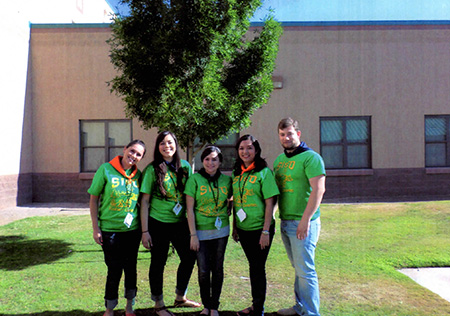By Laura L. Acosta
UTEP News Service
Graduate student clinicians at The University of Texas at El Paso volunteered at several summer camps to help children with fluency challenges, hearing impairments and autism spectrum disorders prepare for a successful school year.
In June, Christopher Roosmalen and four of his fellow graduate students from UTEP’s Speech Language Pathology (SLP) program helped children who stutter practice the fluency strategies they learned in speech therapy during the school year at a fluency camp organized by the Socorro Independent School District (SISD).

Students in kindergarten through fifth grade gathered at Sierra Vista Elementary School for one week to practice various strategies, such as breathing exercises and relaxation techniques to help them speak slowly and steadily.
“My favorite part about this particular camp was being able to support the students attending with the strategies presented to assist with their fluent speech,” Roosmalen said. “In some cases, a few of the kids had experienced bullying because of their fluency problems, so it was really heartwarming when the SISD students came up to UTEP students at the end of camp and told us how much these strategies would help them with their speech at school and with their friends.”
Suzanne Crow, a lecturer and clinical supervisor for graduate students in UTEP’s Speech Hearing and Language Center, believes activities such as the fluency camp allow SLP students to showcase the skills they developed during their practicums at the center by giving back to the community.
“They have been very active in our clinic for three semesters, and we want them to take the skills they learned in their classes and in our campus clinic and apply them in a more natural setting,” Crow explained.
SLP graduate student Alma Acosta had the opportunity to work with a child with autism during her clinical practicum. An autism course she took during UTEP’s Maymester also gave her greater insight into autism, its possible cause, as well as treatment approaches.
These experiences allowed Acosta to gain a better understanding of the children with autism spectrum disorders with whom she worked in SISD’s Strengthening Unique Multitalented Abilities and Responsibilities (SUMAR) camp in July.
Individuals with autism spectrum disoder struggle with social skills, language development, behaviors, emotions or sensitivities, and school-related skills, Acosta said.
SUMAR helps elementary, middle and high school students transition back to school by refreshing their social fluency and pragmatic communication, said Lori Ray, an autism spectrum disorder strategist at SISD and the camp’s coordinator.
Through techniques called “social stories,” which help people with autism develop greater understanding of social behaviors, Acosta and 10 other UTEP graduate students prepared campers for activities including a field trip to Bassett Place mall where they practiced their social skills. Campers participated in a scavenger hunt to find back-to-school items, such as a backpack, pencils and a folder. They also ordered lunch at the food court and purchased movie tickets.
“We also went over joining a group or activity, expressing thoughts and feelings, sensory differences such as sound, organizational skills and managing stress,” said Acosta, who hopes to work with children as a bilingual certified speech language pathologist after she receives her master’s degree in Speech-Language Pathology in May 2015. “These activities and social stories were provided to ease them into the upcoming activities as well as provided them with social information to prepare them for the social interactions, events and expectations.”
Nine students from the SLP program also made language-learning fun for children with hearing impairments at a summer camp headed by Cathy Chapman, a local speech-language pathologist.
The main purpose of the two-week camp is for children to continue language growth and listening over the summer months while they are at home or out in the community, Chapman said.
For the past two years, SLP students have participated in the camp assisting with auditory training and language activities in a fun learning environment.
“After the first year, it was clear if the camp continued to the next summers, I would need help working with the campers,” Chapman said. “Parents and family are key, working with their child. The therapist is to be the facilitator to keep listening and language moving forward. … Having the students on hand kept those communication lines open and helped campers, parents and sibling communicate with each other.”
The camp gave SLP student Aireen Macatula the opportunity to work with children with hearing impairments for the first time.
Macatula helped campers incorporate specific vocabulary words into their daily activities.
“For instance, some of our vocabulary words included actions such as ‘turn around’ or ‘fold,’ as well as nouns like ‘mountain’ or ‘valley,’” Macatula explained. “These words were then incorporated into origami activities by using ‘fold the paper’ or ‘position the paper like a valley.’”
Macatula expects that her experience at the camp will help her become a better speech language pathologist.
“It’s given me hope, creative ideas and great experience to work off if I ever encounter a child or adult with a hearing disability,” Macatula said.